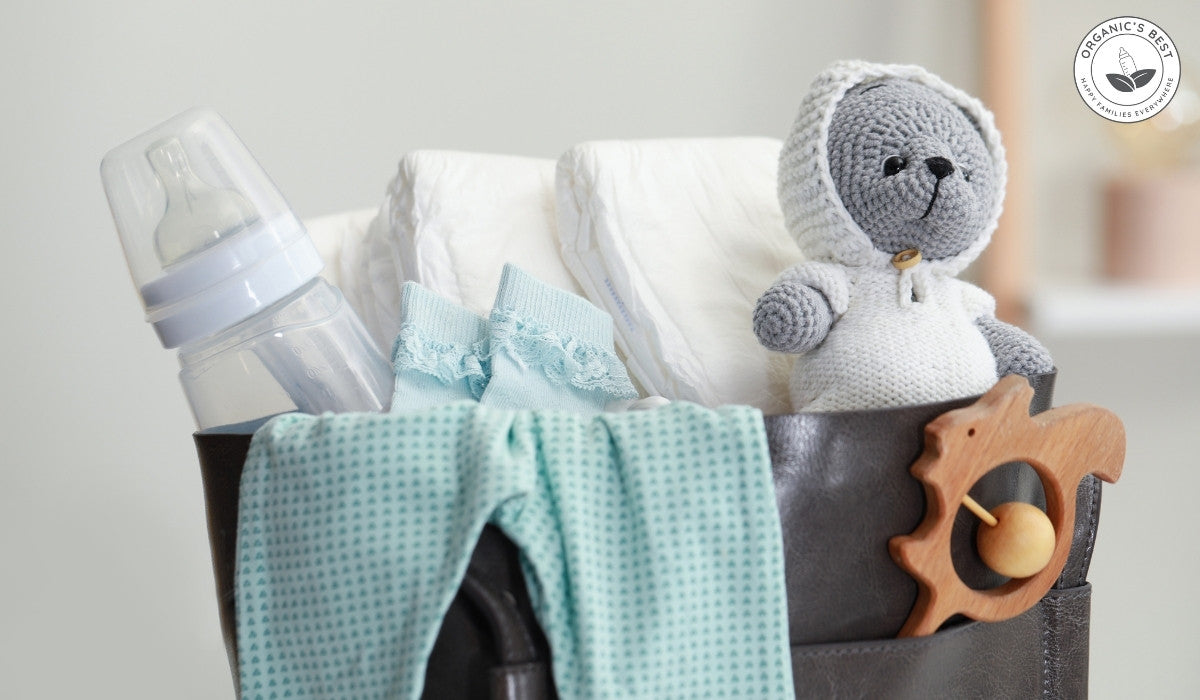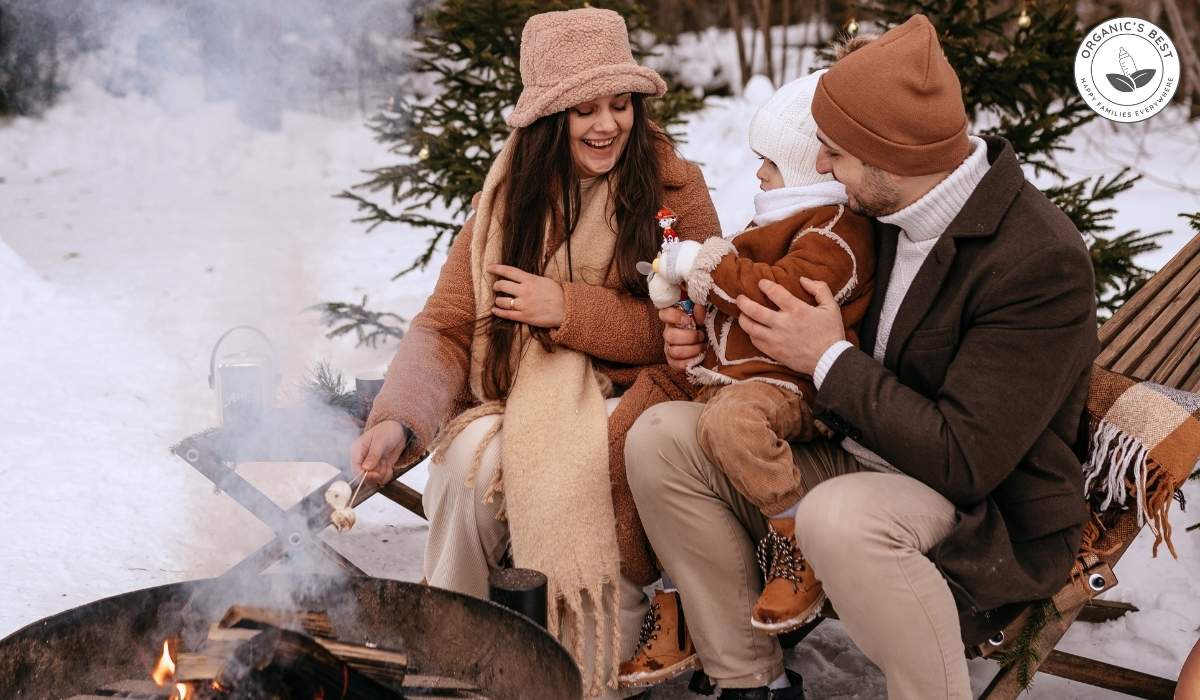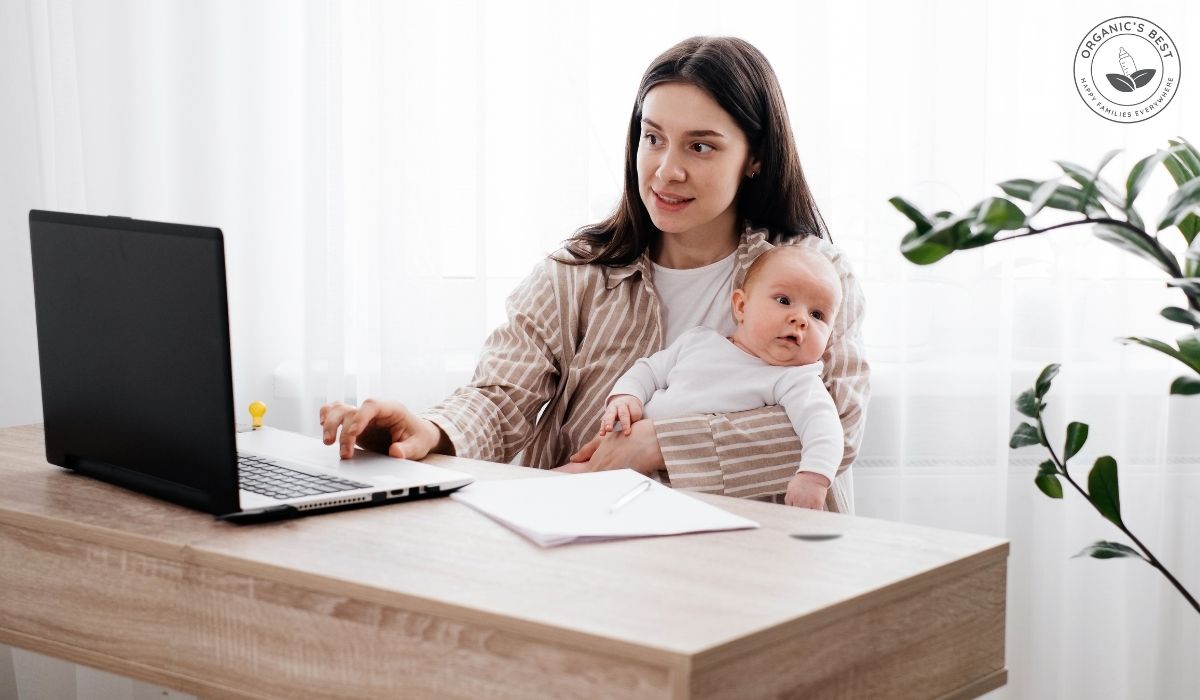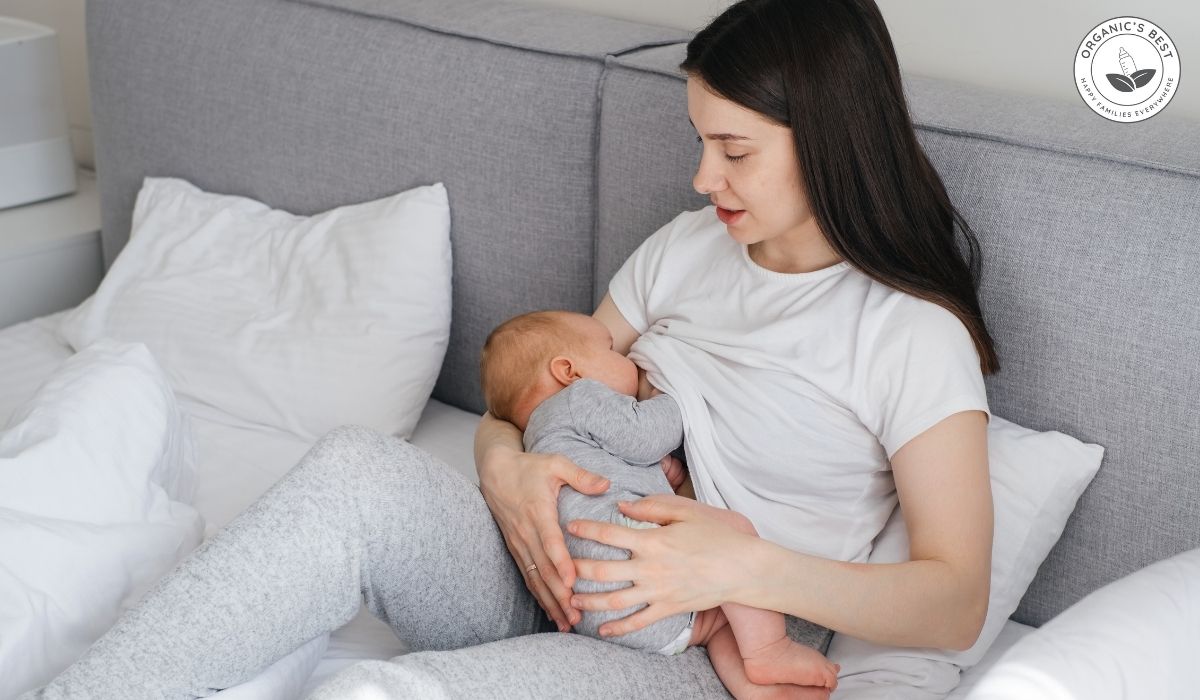Click to Get 2 FREE Boxes/Cans
Click to Get 2 FREE Boxes/Cans
Only New Customers! Click HERE to Get 2 Extra Boxes/Cans for Free With Your First Order.
Only New Customers! Click HERE to Get 2 Extra Boxes/Cans for Free With Your First Order.
BABY FORMULA
Offering new parents top-quality European infant formula from renowned brands like HiPP, Holle, Kendamil, and more. If you’re uncertain about which product to choose, our Formula Finder can help you make the best decision for your baby.
Baby Food
Offering new parents a premium selection of European baby foods, including jars, pouches, cereals, and snacks from esteemed brands like HiPP and Holle.
Diaper Bag Essentials: Checklist for Parents
by Agustina Fernandez February 18, 2025 9 min read

Leaving the house with a baby is no small feat since it probably feels like you need to pack half your home just to make it through a quick errand. That’s where a well-stocked diaper bag comes in.
It’s more than just a bag, it’s your toolkit for handling whatever the day throws your way. From unexpected messes to on-the-go feedings, the right diaper bag and its contents can make life outside the house more convenient and stress-free.
Whether you’re a new parent figuring this out for the first time or you’re looking to streamline your packing routine, this comprehensive guide will walk you through everything you need to keep in your diaper bag.
From must-haves to helpful extras, here’s how to pack a diaper bag that keeps you prepared without weighing you down.
Table of Contents
What to Pack in Diaper Bag: Diaper Bag Checklist
When you’re juggling a baby, a stroller, and everything else life throws at you, quick access to the right diaper bag essentials can make all the difference.
We’ll dive into the details further down, but for those moments when you need a quick reference, here’s a handy diaper bag checklist:

-
Diapers
-
Wipes
-
Changing pad
-
Diaper bag dispenser
-
Rash cream
-
Bottles and nipples
-
Nursing cover and pads
-
Extra clothes for mom and baby
-
Baby blanket and hat
-
Nursing pads
-
Snacks and water
-
Burp cloths
-
First aid kit
-
Baby toys
Diaper Bag Must Haves
Let’s dive into the reasons behind each of these infant diaper bag essentials and why they can make life with a baby a whole lot easier.
Diapers and Wipes
You can’t have a diaper bag without, well, diapers! Whether you’re heading out for a quick errand or planning a full day away from home, these diaper bag necessities will keep you prepared for diaper changes no matter where you are or what you're doing.
As many seasoned parents would suggest, it’s always better to pack a little more than you think you’ll need because no one wants to face a blowout without a spare diaper.
Outside of that tip, here’s what to put in diaper bags to ensure you’re ready for anything that comes your way:

Diapers: On average, you’ll need at least 6-8 diapers per day (with a couple extra packed away for emergencies). We suggest storing diapers in a separate bag or container within your diaper bag. This keeps them organized and easy to grab, especially during urgent diaper changes.
You can also bring different types of diapers for different situations. Overnight diapers are great for long outings, while regular diapers work well for shorter trips.
Wipes: As you probably know by now, diaper changes can be messy, and wipes are a must for keeping things clean and fresh. Plan on having at least 1-2 packs of wipes per day, depending on how long you’ll be out and about.
You can choose plant-based wipes that are gentle on your baby’s sensitive skin. Fragrance-free options are also a great choice to avoid irritation. Remember, wipes are multipurpose and aren’t just for diaper changes; they’re also perfect for sticky hands, messy faces, or quick clean-ups on the go!
Baby Diaper Bag Essentials: Choosing the right diaper bag is just as important as choosing what to put in it. Look for a bag with:
-
Multiple pockets for organized storage. This helps you keep diapers, wipes, and other essentials easily accessible.
-
Adjustable straps for comfortable carrying. Backpack-style diaper bags can be more comfortable, especially for longer outings.
-
Water-resistant material to protect against spills or leaks.
-
A built-in changing mat is great for on-the-go diaper changes. It provides a clean, comfortable surface wherever you are, from public restrooms to the back seat of your car.
Diapering Accessories
Keeping diaper changes quick and efficient is all about having the right accessories.
If your diaper bag doesn't come with a built-in changing mat, then a portable changing pad is a must-have. Look for one that’s easy to wipe down and folds compactly for easy storage.
Here are some other essentials to include:
Diaper Bag Dispenser for Dirty Diapers: This keeps odors contained and makes disposal more convenient. You can choose reusable bags or cloth diapers for a more eco-friendly option.
Diaper Rash Cream: This protects your baby’s sensitive skin from irritation. You can apply it as needed, and it is especially helpful after prolonged exposure to a wet diaper.
Feeding Essentials: Formula or Breast Milk
What you pack in this section will depend on whether you're breastfeeding or formula-feeding, but one thing applies to both: feeding on the go can be unpredictable. That’s why being prepared is key!
Bottles and Nipples: If you’re bottle-feeding, make sure you pack bottles and nipples in an easily accessible section of your bag. You might also want to consider packing extra nipples if your baby is particular about which type they prefer.
Formula: To make things even easier, pre-fill bottles with cooled, previously boiled water or bottled water labeled ''sterile'' if your baby is less than 3 months old / medically vulnerable. That way, the bottles are ready to go, and you can just add the formula when needed. You can also pre-measure your baby’s formula and pack it in a small, portable container for convenience.
Breast Pump and Storage Bags: If you’re breastfeeding, you'll need a breast pump and storage bags if you plan to express milk while out. A pump allows you to maintain your milk supply, and storage bags make it easy to carry and store expressed milk until you’re back home.
Be sure to have a cooler bag with an ice pack to keep the milk fresh if you plan to store it for later.
Nursing Cover: If you’re breastfeeding in public, a nursing cover can provide privacy and comfort. Some nursing covers even come with a breathable fabric, so your baby stays cool and comfortable while you nurse.
Clothing and Accessories
Babies are full of surprises, and accidents happen when you least expect them. Packing a few extra clothing items can help you stay prepared.
Extra Clothes for Baby: We suggest having at least one spare outfit for your baby, including a backup onesie, pants, and socks.
Whether it's from a diaper blowout or simply the mess that comes with snack time, being able to change your baby into clean clothes quickly will keep them comfortable and avoid unnecessary fuss. Keeping an extra layer on hand for cooler weather, like a jacket or sweater, is also a good idea.
Extra Shirt for You: Sometimes, the messes aren’t just reserved for your little one. Babies have a way of sharing their spills. Whether you're on the receiving end of a projectile spit-up or an unexpected blowout, you’ll quickly learn that your shirt is just as likely to get dirty as your baby’s. Having a backup in your diaper bag can be a lifesaver when you need a quick change.
Baby Hat: A soft, lightweight hat is one of those items you might not always think about but will end up needing more than you expect. If you’re out during cooler weather, a hat keeps your baby’s head warm, which is essential since they lose heat through their heads.
A hat can also be a useful shield from the sun when you're outside, especially for babies who are still too young to wear sunscreen. Plus, it adds an extra layer of comfort for naps on the go.
Baby Blanket: A soft, cozy blanket can serve multiple purposes. Of course, it’s great for warmth, whether you’re outside on a chilly day or need to bundle your baby in the stroller. However, it can also be a makeshift play mat, perfect for park outings and playdates.
Hygiene and Health
Your baby's health comes first, and a few key items can help you handle unexpected situations with ease:
Hand Sanitizer: Hand sanitizer is a must-have, especially when you’re on the go and soap and water aren’t available. Whether you need to clean your hands before a feed or quickly wipe away dirt, hand sanitizer ensures you’re keeping things clean and safe for you and your baby.
Thermometer: A thermometer can come in handy if your baby starts showing signs of discomfort while away from home. If your little one seems unwell or feels warmer than usual, having a thermometer on hand can help you quickly assess the situation.
First Aid Kit: Packing a first aid kit with essentials like band-aids, ointment, and gauze can prepare you for minor scrapes or cuts.
Nursing Pads: Nursing pads are great for preventing leaks while breastfeeding. They absorb any excess milk and keep you comfortable and dry throughout the day.
Snacks and Drinks
Keeping everyone happy often means having snacks and drinks ready to go.
Water Bottle: Staying hydrated is vital for both you and your baby. If you're breastfeeding, drinking enough water is even more crucial. Keep a water bottle in your diaper bag for easy access when you need it. A reusable bottle is also eco-friendly, and it can be refilled whenever you need it.
Snacks: For your baby, easy-to-eat options like puffed snacks, fruit slices, or small crackers are perfect for keeping them satisfied between feedings. For you, pack a few snacks that are simple to grab, like granola bars, nuts, or dried fruit.
Entertainment and Distractions
Keeping your baby entertained and calm while you’re out of the house may take some practice. Here are some must-haves to help prevent meltdowns.
Toys: Pack some small toys that are easy to carry and grab for quick entertainment. Whether it's a soft rattle, a teething ring, or a tiny plush, having toys on hand can help distract your little one and keep them content. Choose lightweight and easy-to-clean items so you’re always ready to entertain.
Pacifiers: For many babies, pacifiers offer comfort during times of restlessness. It’s always a good idea to carry a few extras in your diaper bag for emergencies. Whether it’s to soothe your baby during a long car ride or help them settle down in public, having a pacifier handy can be a real lifesaver.
Burp cloths: Babies often spit up after feedings, especially newborns. So add burp cloths to your newborn diaper bag checklist. These cloths are helpful for quickly wiping up messes after feedings or during tummy time. They can also double as a clean surface for laying your baby down when you're in a pinch.
How to Carry Formula in a Diaper Bag
Feeding your little one away from home does not have to be complicated. Here are a few simple ways to stay prepared:

-
Pre-measure formula: To save time, measure out individual servings of formula into a dispenser or small container. This makes mixing quick and easy, no matter where you are.
-
Separate bottles and water: Store bottles and pre-measured water separately in your bag. This helps you mix the formula fresh when you’re ready to feed, keeping it from spoiling.
-
Use a cooler or insulated pocket: If you need to store pre-made bottles, make sure to refrigerate them immediately and use them within 24 hours. They should be stored in a cooler kept at 4 °C and transported for no more than 2 hours. However, it is best to avoid pre-mixing formula because it can spoil quickly if not handled properly. Mixing on the spot keeps your baby’s bottle safe and fresh!
Diaper Bag Packing Tips
Here are some tips to keep everything in order and ready to go:

Organize by Compartments
We know you're busy taking care of your tiny tot, but staying organized to the best of your ability can help you stay prepared.
For example, using the pockets and compartments of your diaper bag to group similar items together can save you time and frustration when you need something fast. This way, you’ll know exactly where to look, and nothing will get lost in the shuffle.
Prioritize Essentials
When it comes to packing your diaper bag, focus on the essentials first. Diapers, wipes, and a changing pad are non-negotiable, and everything else is just nice to have.
Portion Bottles
Pre-measure your formula and water into separate containers or dispensers to make feeding quicker and easier. This way, you’ll save time when your little one starts showing signs of hunger. All you’ll need to do is mix the formula and water, and you’re good to go!
Clean and Restock Regularly
As soon as you get home from your outing, take a moment to clean and restock your diaper bag. Wipe down any messes, throw away any used items like dirty diapers, and refill your bag with what you’ll need for next time.
This simple habit keeps your bag ready to go and helps you avoid any last-minute packing stress.
Baby Diaper Bag FAQs
Here are the answers to some of your most-asked diaper bag questions.
How Many Diapers Do You Need in a Diaper Bag?
It is best to plan on at least 6-8 per day, but you can adjust depending on your baby’s age and needs.
Your newborn diaper bag will look different from a diaper bag for toddlers, so be sure to plan around your child's needs and update your diaper bag list accordingly.
Is a Diaper Bag a Necessity?
While technically, you could use any bag, a dedicated diaper bag with multiple compartments and features designed for baby gear makes life much easier.
A well-packed diaper bag is your lifeline when you’re out and about with your little one. By organizing essentials and being prepared for different scenarios, you can handle whatever the day throws at you.
Every parent’s needs differ slightly, so customize your diaper bag checklist to fit your lifestyle and your baby’s needs. Happy packing!
|
Disclaimer: Please be aware that this information is based on general trends in babies, and it is not medical advice. Your doctor should be your first source of information and advice when considering any changes to your child’s formula and when choosing your child’s formula. Always consult your pediatrician before making any decisions about your child’s diet or if you notice any changes in your child. Breastfeeding is the best nutrition for your baby because breast milk provides your child with all the essential nutrients they need for growth and development. Please consult your pediatrician if your child requires supplemental feeding. |
Agustina Fernandez
Dr. Agustina Fernandez earned her medical degree from the prestigious Universidad Nacional de Córdoba, Argentina. With a deep-rooted passion for pediatrics, Dr. Fernandez is currently on the path to specializing in children's healthcare. Recently, she has delved into the vital field of infant nutrition. Her research interests include breastfeeding, infant formula, and baby food in little ones’ formative years. Dr. Fernandez's commitment to this area of study underscores her dedication to ensuring the health and well-being of children from their earliest days.
Leave a comment
Comments will be approved before showing up.
Also in Organic Infant Nutrition and Health Blog

10 Winter Activities for Kids and Toddlers
by Agustina Fernandez January 06, 2026 8 min read
Read More
How to Choose The Best Infant Formula: A Guide to EU Organic Formulas
by Agustina Fernandez January 05, 2026 14 min read
Read More
Best Formula for Breastfed Babies 2026 Guide
by Agustina Fernandez January 05, 2026 15 min read
Read More
Reviewed by Dr. Bardha Citaku, MD
-

Dr. Bardha Citaku: Medical Reviewer of Organic's Best Blog
Dr. Bardha Citaku completed her medical studies at the University of Prishtina in Kosovo, where she began her journey into the field of medicine. She has since developed a career in medical research, contributing to projects with notable organizations, including the World Health Organization (WHO).
